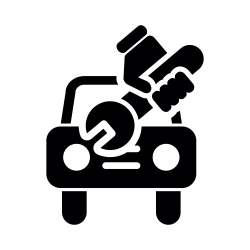When you are purchasing a used car, it may – or may not – have time left on the original manufacturer warranty. If the vehicle has exceeded the terms of the original warranty, you may want to purchase an extended warranty, also known as an extended service contract.
When a car rolls off of the production line, it is covered by a manufacturer warranty. The terms and lengths of the warranties vary based on the manufacturer. But when you are purchasing a pre-owned vehicle, you will only be eligible for whatever manufacturer-supplied warranty is left based on years and/or mileage. For example, Ford’s Basic Warranty expires at 3 years or 36,000 miles – whichever comes first – so, even though a vehicle may be only two years old, if it has over 36,000 miles on it, it will not have that warranty coverage.
Service contracts are beneficial for used car buyers with bad credit because although recent vehicles are indeed more reliable, the advanced features and safety systems cost more to replace if they malfunction. If you are trying to maintain a budget, and even if you should have some funds set aside to cover maintenance for the vehicle, you probably don’t want to have to deal with high repair bills.
What Is An Extended Warranty?

While some may use the term extended warranty for this type of protection, it’s not actually an extension of the original warranty – it’s a used car service contract, not unlike a type of insurance policy. Typically, these contracts range from $25 to $35 per month, and may or may not have a deductible when repairs need to be made.
- Know what is covered.
When purchasing an extended service contract, be sure that those essential items that are most likely to encounter issues are covered, such as the anti-lock brake system, electrical system, automatic or manual transmission, air conditioner and power-steering systems. - Who is backing the service contract?
There are two basic types of coverage: manufacturer backed and third party. The ones that are backed by the manufacturer will allow repairs to be made in any franchised dealership by factory-trained technicians using factory parts. It would basically be an extension of the original manufacturer warranty even though the systems covered may vary. If you are getting a service contract through a third party, the repairs may need to be done at a repair shop or dealership that is authorized by the company you have the service contract with in order to be covered.The drawbacks of a third party company are that you may lose the coverage you have paid for in the event that the company goes out of business. Some contract providers may even require you to pay for the entire repair first and wait for reimbursement from them. As a best practice, avoid these types of plans.
- Will you need it?
If you are dealing with damaged credit and/or financial issues, you will benefit greatly from the right kind of contract on your new or used car in order to avoid costly repairs. Be sure to read the terms and conditions carefully before signing the dotted line on any service contract you are considering.